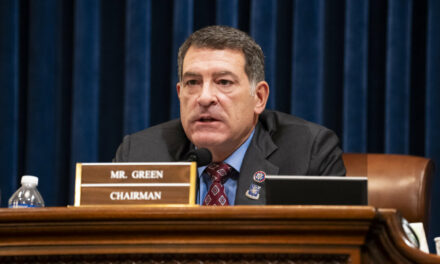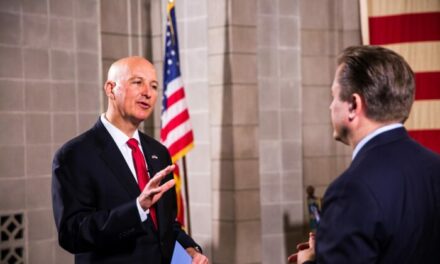We support our Publishers and Content Creators. You can view this story on their website by CLICKING HERE.
Sharply divergent views of federal election campaign law and the legitimacy of former President Trump’s May 30 conviction emerge at a hearing on Capitol Hill
Witnesses called to testify before a GOP-led House committee on June 13 offered starkly divergent views of the validity of using federal campaign law in the New York prosecution of former President Donald Trump.
Former Federal Election Commission (FEC) Chair James Trainor testified at a House Judiciary Committee hearing that Manhatten District Attorney Alvin Bragg’s case against former President Trump drew on an unusual interpretation of the Federal Election Campaign Act (FECA)—one that sets the bar for violations so low that it might well set a precedent for any number of politically motivated prosecutions.
Other expert witnesses hit back hard against Mr. Trainor’s testimony, arguing that the $130,000 the former president’s operatives tagged as payments for legal services so far exceeded the limit under campaign finance law that anyone who perpetrated such a scheme would incur a felony conviction.
Last month, the former president was convicted of 34 felony counts of falsification of business records in relation to $130,000 in so-called hush money payments made to adult film performer Stormy Daniels, whose real name is Stephanie Clifford, ahead of the 2016 presidential election. The payment records were allegedly fraudulently disguised as part of a retainer agreement.
Manhattan prosecutors had charged President Trump with felony-level charges, which required the business records fraud to be carried out to commit or conceal another crime. The secondary crime, prosecutors alleged, was a New York election law that criminalizes conspiracy “to promote or prevent the election of any person to a public office by unlawful means.”
The unlawful means identified by prosecutors were violations of the FECA, the falsification of other business records, or violations of tax laws. New York State Supreme Court Justice Juan Merchan ruled that the jury did not have to unanimously agree on what the “unlawful means” was. The prosecution also did not have to prove that the secondary crime was actually committed.
The at-times contentious House panel hearing turned largely on the opposing views of two witnesses, Mr. Trainor and Norman Eisen, a former U.S. ambassador to the Czech Republic who sat in on the six-week trial in Lower Manhattan.
Mr. Trainor characterized Mr. Bragg’s actions as an example of judicial overreach that shows disregard for the statutory framework of the FECA, whose enforcement powers he said properly belong to the Federal Election Commission and the Department of Justice, not to local district attorneys such as Mr. Bragg.
This highly precise allocation of powers is necessary to prevent a “fragmented enforcement landscape,” in which every district attorney in the country pursues enforcement actions based on his or her own personal interpretation of the law, he said.
“By doing so, Bragg has effectively usurped the jurisdiction that this Congress has explicitly reserved for federal authorities. This overreach sets a troubling precedent for the politicization of legal proceedings at the state level,” Mr. Trainor said.“The danger here lies in the disparate enforcement standards that torture well-established federal law processes.”
“Now, imagine fifty states enacting the crime of campaigning by unlawful means, and a thousand different state and local prosecutors prosecuting presidents, former presidents, presidential candidates, and any number of House and Senate candidates under varying interpretations of FECA by bootstrapping those laws to their states’ unlawful means criminal code,” he said.
Under questioning from lawmakers, Mr. Trainor clarified what does and does not constitute a campaign contribution under federal law. A candidate who pays a legal fee to keep divorce papers sealed because the candidate does not want their contents aired during an election, for example, is not in any way guilty of having improperly tried to influence that election’s outcome, he contended.
The Epoch Times has reached out to Mr. Bragg’s office for comment.
Grading Justice Merchan
A lengthy rebuttal came from Mr. Eisen, who said he was in court throughout the six-week proceedings, and reminded those present that a jury of 12 citizens, not a politicized judge or prosecutor, found former President Trump guilty of the 34 felonies.
“I spent most of the trial watching them, and, unlike some in court who dozed, they paid extremely close attention throughout. The jurors got it right,” he said.
Mr. Eisen differed sharply with other witnesses about what federal election law does and does not permit. He suggested that a hush money payment does indeed fall under the category of a campaign contribution and that the $130,00 paid to Ms. Daniels exceeded, by no less than $127,000, the maximum legal contribution to a political campaign.
Mr. Eisen added that, contrary to what some believe, Justice Merchan “bent over backward” to be fair to the defense, granting motions from the defendant’s lawyers. He asked why the former president should have gotten away with 10 gag order violations before incurring a warning that a fourth would bring a potential punishment.
Moreover, when defense lawyers inexplicably failed to object to portions of Stormy Daniels’s testimony that were sensational and of questionable relevance to business records and election law, the justice himself stepped in to raise reasonable objections, doing the Trump lawyers’ work for them, Mr. Eisen said.
“Justice Merchan was judicious on that and many other occasions, as I believe the appellate review will demonstrate,” said Mr. Eisen.

 Conservative
Conservative  Search
Search Trending
Trending Current News
Current News 







